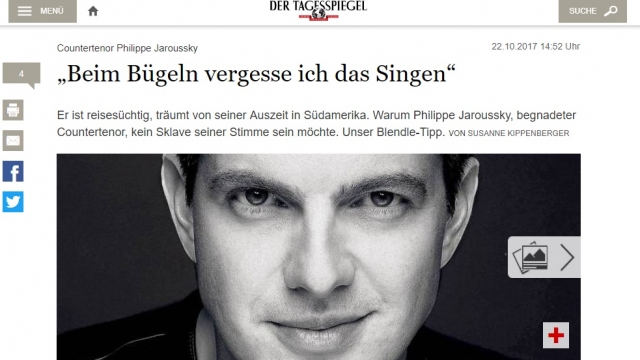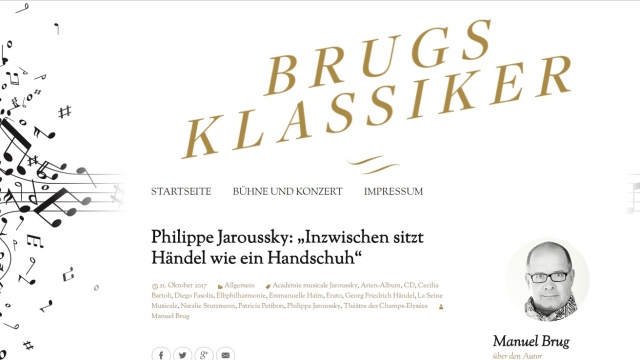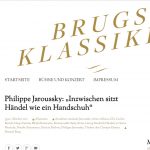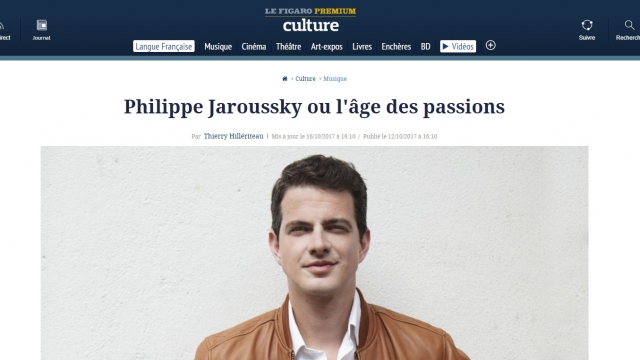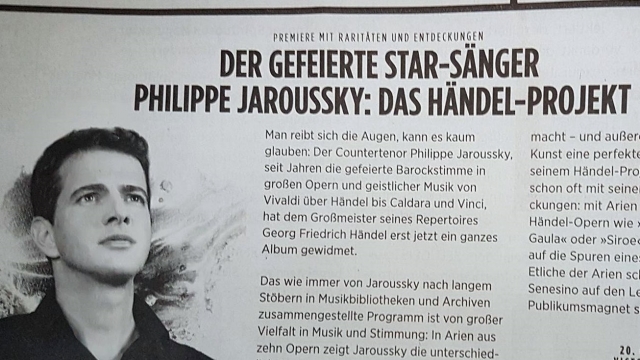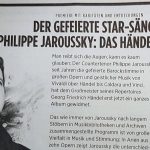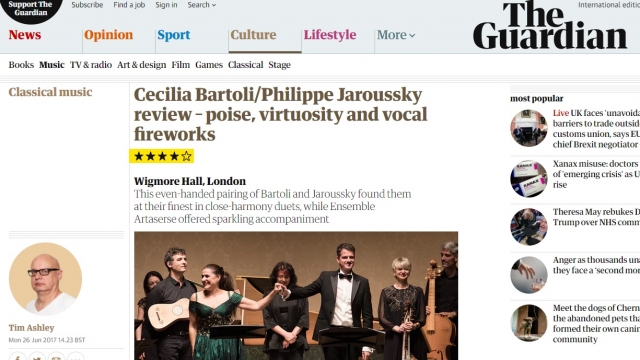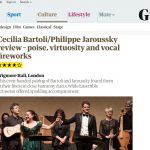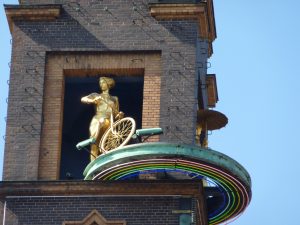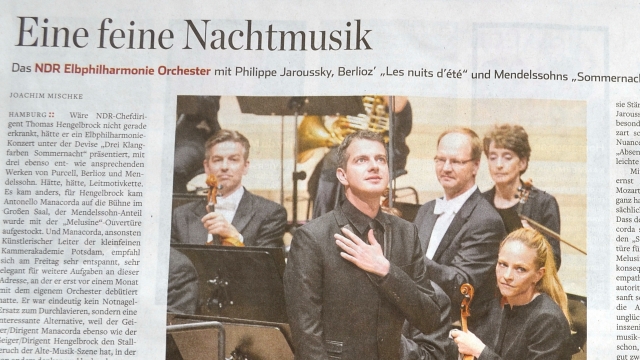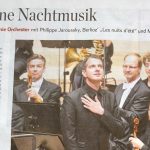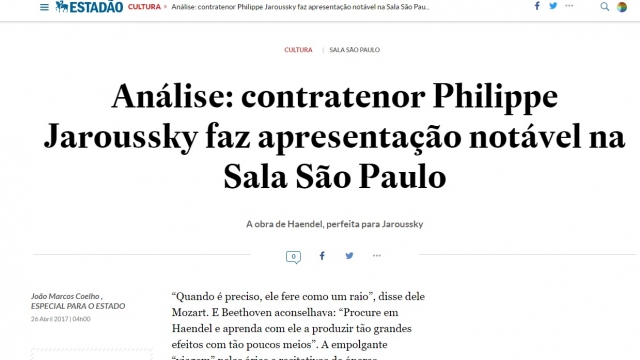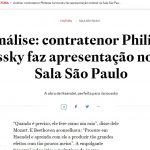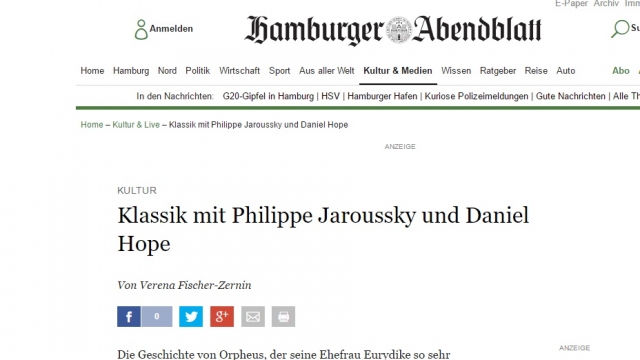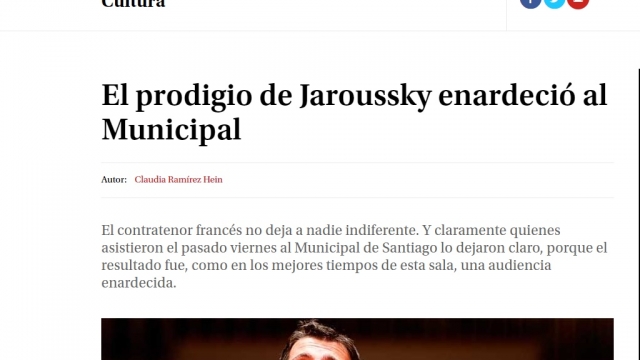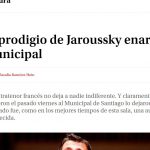2017-10-22, Der Tagesspiegel, by Susanne Kippenberger
“Ich will mein Hemd selber glätten. Dabei vergesse ich das Singen, höre auf, meine Stimme zu prüfen – ich bügle mein Hirn.”
Source/Read more: [x]
*This is a fan translation. If you have any problems with this being online, just drop us a line and we’ll remove it immediately. Translation by Lankin*
“When I’m ironing, I forget about singing.”
He is an enthusiastic traveler, dreams of his time-out in South America. Why Philippe Jaroussky, divinely gifted countertenor, does not want to be a slave to his voice.
Interview: Susanne Kippenberger
Monsieur Jaroussky, you sang at the inaugural ceremony of the Elbphilharmonie, were artist in Residence at the Konzerthaus in Berlin, have been awarded the Echo Klassik in the category “Singer of the Year” twice …
… sometimes I almost feel like the Germans adopted me. Right after France, it’s the country where I perform most often.
At the Berlin Philharmonic hall, you are doing a concert with arias by Georg Friedrich Händel. What is so fascinating about him?
He is the best! His harmonies are just so much richer than those of all the operatic composers of his time; there is a true dialogue between voice and orchestra. And what really moves me, is that sometimes I sense the admiration he had for certain singers. I also love the inconsistency. Händel was notorious for his difficult character, was said to be choleric, but his music has something very sensitive, sensual, and sweet to it.
On a tour like this one, you travel from one city to another. Quite exhausting.
I have an important ability: I can sleep well. Ten, twelve hours. While you sleep, your vocal chords take a rest. Before a concert, I don’t get up before noon, talk to no one after I wake up for two more hours, slowly wake up my body and only sing a few exercises. At the day of the concert, it is my job to do nothing. Perfect! Because I’m lazy. I am aware of my privilege – you can do what you like, no one is sitting next to you and pressures you to anything. Many people don’t even know that feeling, have family, are running around.
You must be joking about the laziness. You recorded thirty albums, to name only one thing!
I am curious! All the time, I have new projects in my head which I would absolutely like to do. There is a lot of talk that the CD is dying as a medium, but at the same time, a lot of them are being recorded. Maybe it’s just because of that – before it’s over.
To catch you at your home in Paris is luck of the draw.
I just returned from a two-week concert tour. First thing I had to do was cook. I had enough of restaurants and room service.
So what was it for dinner?
Pot-au-feu, that takes long to make, lovely. Cooking is a good method to let your mind go blank; there is nothing else you think about while you’re cooking. That’s why I always ask for an iron in my dressing room. I want to iron my own shirts. I am forgetting about singing then, stop checking on my voice – I am ironing my mind.
You are known for your outfit: black shirt, black tie, black jacket.
In Baroque ensembles, most musicians wear black. When I dress like them, I become a part of them. I consider my voice to be sort of another instrument. Also it highlights the hands and the face. Black signals sobriety, it guides the focus more towards the music.
You used to play a proper instrument: the violin. How would you compare the two?
In the beginning, maybe I treated my voice too much like an instrument, focused too much on technique, rhythm, phrasing. I didn’t really know how it worked, to express words, and being authentic. Especially when it comes to opera, we often exaggerate; there is permanent crisis, big drama. However, you have to get a clear idea of what you really want to say. Now I want to share this with young musicians; that’s why I founded my academy.
At the school on the outskirts of Paris there is not only a program for young musicians but one for children as well. Quite uncommon, or isn’t it?
In my family, no one made any music. If I didn’t have this one teacher at school who told my parents: “I believe Philippe has to make music,” I never would have done it. It changed my life! I want to give children the opportunity – children with difficult circumstances, immigrants as well – to get in contact with classical music. There are a lot of sports projects in the Banlieues of Paris. That’s great! However, there are also children who aren’t natural athletes, but have a musical talent.
And everyone is happy in the end?
Of course there are going to be difficulties. Some will give up. The program is intense; the children who learn the piano, the violin or the cello should be kept on track by the progress they make. I want them to be surprised about themselves. They will quickly move on to real music – not stupid exercises, but little pieces by Mozart or Schubert.
When did you know that you wanted to be a musician?
When I was eleven, I started playing the violin. Music totally fascinated me; I played incessantly. With 16, I knew that at least I wanted to try to become a musician.
And your parents supported you?
Yes, yes! A lot!
Your own story is a great surprise: you were studying composition, when you were sitting at the concert of a countertenor, and you decided: That’s what I want to do as well! What made you so sure?
That’s hard to explain. I hadn’t even sung in a choir before. At home, I sang a bit higher than most, and for a violinist, high notes have a certain attraction. When I heard Fabrice de Falco sing the Händel arias, deep down, I had this feeling: That’s mine! It’s a calling. That voice called out to me. Basically, it took one evening for me to reach the decision to become a countertenor. It needs to be said that I wasn’t particularly happy as a violinist. Again and again I got to hear that I had been starting too late. The biggest part of the lessons was spent on technique. As a singer, you talk about the body a lot. After all, your voice is inside there.
And, how was it?
When at 18 I started singing, I was enthusiastic like I’d never experienced it when I played any instrument. But the vocal range hit closest to my personality. I can give more of myself, of my soul.
Can you be more specific?
Well, we all have a masculine and a feminine side, and as a countertenor, you accept that. There are people who find that a man shouldn’t sing like that, that it was ridiculous – for others, it’s magical. Often we hear that we sound like women, but that’s not true. I rather noticed that many of my colleagues have something utterly boyish about themselves. Me too! Even at almost 40. Maybe the voice has a part in preserving that quality.
As a singer, does aging frighten you?
Of course, the voice is changing, is getting bigger, lower. Maybe you lose in terms of flexibility and agility. If you want to keep the two, you have to work on it. On the other hand, young singers often exaggerate in their acting. As you get older, it becomes more natural.
But isn’t it a threat, in the end?
I met a lot of singers who were devastated when they lost their voice. They had spent all their lives with it – and suddenly, they can’t do it anymore. That’s one of the reasons why I founded the academy and why I’m conducting as well. I was a musician before I became I singer, and I will remain one after I quit singing. When I’m telling my fans that I am not quite sure whether I’ll sing yet in ten years’ time, they’re shocked. I like the idea – that I could stop, that there is a limit. It makes me enjoy the moment even more.
It must be hard, to decide when the moment to quit has finally arrived.
I don’t want to be a slave to my voice. That’s why I took a sabbatical a few years ago, three quarters of a year. The first two months, I was feeling guilty that I wasn’t singing. After four month, I felt like I could quit forever. I thought, maybe it’s not as important as I’d always thought, after all; there are other important things in life.
How did that change your voice?
It’s like rebooting a computer. It’s also important for me not to become a music machine – traveling from one concert to the next, cash the money, and next stop – to stay fresh.
Wasn’t it a huge issue, to take some time off? You are booked years in advance.
In fact, that’s what makes it simple. I already know when I’ll be taking my next time-out: start of 2019, five months.
And what will you be doing in that sabbatical?
Traveling! I’m addicted. Spend the winter in South America. I enjoy speaking Spanish, and I like the culture there. The population is very young; there is this incredible energy. People are enjoying the present, they dance and sing in the streets.
And that’s what you’ll be doing?
Maybe not. But the energy is contagious. The people there touch my heart; they are generous, enthusiastic.
But you’re on the road all the time anyway.
On a concert tour, I never have any time to go sightseeing, to really take time to see friends. When you are touring with an orchestra, you cannot just splice in a day off in between – that would be far too expensive. And as a singer, you become a baby. You’re being pampered, they pick you up at the airport, they bring you something to eat, you don’t have to care about anything. When you travel by yourself, no one knows who you are; you don’t get any special treatment.
And you really enjoy that?
Yes! Sometimes, people are even gruff. That’s life, isn’t it? When you’re a singer, everyone is so nice – but maybe only because you are a singer. That’s why it’s important to get back to reality.
How do you manage to maintain relationships, friendships?
I have been together with my partner for ten years now, and it works out well. However, he rather adjusts his life to mine than vice versa. Obviously, I cannot do my job from home. It’s more difficult when it comes to friends, even family.
Are your parents still living in the suburbs of Paris, where you grew up?
My mother, yes. My father died last year. He was 74. It was very quick, cancer, there was nothing that could be done. To lose a parent is a big cut. I had so much luck – a loving family, success, friends, a nice life in Paris, travels. Until then, I’ve always been sheltered, nothing really bad ever happened to me. His death has marked a huge change. Positive. We keep complaining about one thing or the other, and don’t even realize what a gift life is. And suddenly, someone who you love dies. His death has given me a certain distance, a new perception of what is important and what isn’t. That extends to the stage of course. I try to represent less, and just be there. It might shock you, but I got the feeling that I sing better now. With more depth to it.
Music is extremely emotional.
That’s right, but we have to have more confidence in the music, not push to the front. A conductor once told me: Maybe we should just sing the notes. Like they are written there. I am a huge Ella Fitzgerald fan. She just sings the right note, no more, no less. She is herself.
Your repertoire also contains religious pieces. Do you feel connected there?
I don’t believe in God, but I do have a connection to sacred music, to its spirituality. Maybe even more than I feel towards opera. There you are playing a role. It’s hard for me anyway, to be someone else, and that’s what opera is about of course – you have to become king, lover, murderer. Whether sacred music is about more than just yourself. It’s more universal.
On tour, you live the life of a businessman. You’re flying business class, stay in business hotels. When you’re in Paris, are you living more of an artist’s life?
Oh yes. That’s one of the reasons why I love this city so much. Even if the life there is a bubble too. I go to organic restaurants, try to live environmentally conscious, but on the other hand I am traveling by plane all the time – a disaster for the planet. I’m full of contradictions, like everyone. You have political ideas, and do the exact opposite.
Just the quarter where you live – diverse, lively – has been targeted in the 2016 attacks. Are you more afraid these days?
Back then, the possibility that a woman like Le Pen could become president truly terrified me. In my everyday life, I am not afraid. I’m only a little bit nervous when it comes to flying. But sometimes I think: I could die tomorrow – I’ve been leading such an intense life. Maybe it’s also connected to my father’s death, that since then I got the feeling: everything that’s happening now is an extra. That’s wonderful. What I am doing from now on is pure joy.
Philippe Jaroussky, 39, is considered the best countertenor of our times. Both critics and audiences celebrate the “Man for the Angel Fach” (Süddeutsche) – for the ease of his singing as well as for the versatility of his repertoire (from Baroque to French songs), and his genuine appearance. In 2008, Jaroussky was the first countertenor to be awarded the Echo Klassik “Singer of the Year” – a prize he was re-awarded in 2016. The Frenchman, raised in the suburbs of Paris, only started singing at 18. Before, he had been playing the violin and the piano as well as studied composition. In 2002, Jaroussky – who even has an asteroid named after him – founded his own chamber ensemble, the “Ensemble Artaserse.” Just now, he inaugurated an academy, located in the new concert hall “Seine Musicale” on the outskirts of Paris, teaching young professional musicians as well as children from low-income backgrounds. This Sunday, on 22nd October, the countertenor is giving a concert at the Berlin Philharmonic hall. He will be performing the program of his new CD: Arias by Georg Friedrich Händel (Erato/Warner Classics.) During the talk at a bistro in his quarter in Paris, close to the Place de la République, the musician – sweat shirt, five-o’clock shadow – was radiating enthusiasm. Despite the first grey hairs, he has an air of boyishness and relaxedness about him. The singer also told us about the origin of his distinctly not French name: his great-grandfather was leaving Russia, and told the border guard “Ya ruski” – I’m russian.
Source/Read more: [x]

